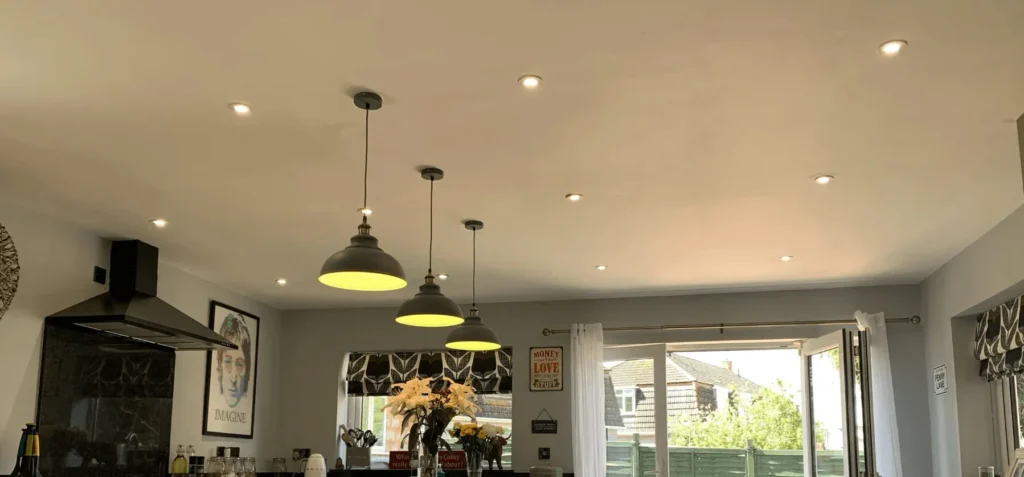LED lights are taking over the light fixture market. Though it may have grown exponentially and may seem like a passing trend, the benefits of LEDs make a strong case for it to stay. But are LED lights better than the regular lightbulbs?

This article will look into this by evaluating its benefits over the traditional light bulbs.
What Are LEDs?
LEDs are solid-state semiconductor devices that emit light when an electric current passes through them. They’re more efficient than incandescent lights, meaning they can provide more light for less electricity. LEDs also have a longer lifespan and are capable of lasting for decades without any degradation in performance—that’s about 50 times longer than other lighting options.
And because their colour temperature is adjustable over a much broader spectrum (meaning warmer or cooler), LEDs can be used to create the perfect atmosphere for any kind of situation: bright white in office spaces, warm yellow at home, cool blue for parties—the possibilities are endless!
What Are The Available Options For Light Bulbs?
Broadly, there are three popular options for light bulbs and they are:
- Incandescent bulbs – These are the traditional, “old-fashioned” bulbs that most of us grew up with. They’re not very energy-efficient and have a shorter life span.
- Compact fluorescent lightbulbs (CFLs) – These are “spiral” bulbs that are comparatively more energy efficient than incandescent bulbs.
- LEDs – these bulbs are very energy-efficient and are more aesthetically pleasing as it looks like the incandescent bulbs.
The main differences between each of the types of bulbs are the different amounts of energy required to power them. But it’s LED bulbs that we really think you should be paying attention to.
And here’s why!
What Are The Benefits Of Using LEDs?
Let’s look at some of the advantages of using LEDs to help address our main question at hand – are LED lights better?
Below are some points to consider:
More Cost Effective
As a general rule, LEDs are more efficient than incandescent lights and less expensive to use. For example, an LED light bulb that costs £12 will last for about 5 years and consume less than £2 worth of electricity, while a similar incandescent bulb might cost less than £3 but last only 1 year before burning out—with energy costs reaching over £20 in that time period.
Long Lifespan
When it comes to the lifespan of LED bulbs, you can expect them to last much longer than regular light bulbs. While incandescent bulbs burn out after about 1,000 hours and fluorescent lamps usually last between 15,000 and 20,000 hours (though they tend to lose their effectiveness before then), an LED bulb will remain bright for at least 20 years.
Energy Efficiency
In addition to being long-lasting, LED bulbs are also energy-efficient. They also offer better colour quality than other types of lighting.
While incandescent bulbs produce warm white light similar in temperature as sunlight at noon on a clear summer day (2700 K), LEDs provide crisp daylight tones (5000 K).
This makes them ideal for task lighting in kitchens because they don’t give off any heat—or glare—when used at night while cooking or reading recipes while prepping food.
Improved Environmental Performance
The environmental benefits of LEDs are huge! They produce no heat, so they don’t require air cooling or fans. Because they don’t need to be cooled, LEDs also consume less power than traditional incandescent bulbs and can last for years without needing to be replaced.
This means fewer greenhouse gas emissions during production and use, less energy wasted on air conditioning/cooling systems to manage heat buildup in buildings around, and reduced demand for electricity—which would otherwise come from fossil fuels like coal or oil that emit greenhouse gases when burned as fuel sources.
Furthermore, since LEDs don’t contain any UV emissions (which can damage your eyesight), mercury (a toxic metal used in many other kinds of light bulbs), or toxic chemicals such as lead oxide (another ingredient sometimes found in older lighting systems) you won’t have any waste products left over after using them—no hazardous waste!
Operates Better In Cold Conditions
The ability to operate in cold temperatures is another important advantage of LEDs. The LEDs used in streetlights, for example, are designed to provide light even when the temperature drops well below freezing. In some cases this capability is critical; for instance, if you have lights on top of your house that have to operate 24 hours a day regardless of weather conditions.
LEDs can also run at much higher voltages than other types of bulbs and don’t require special fans or heat sinks to keep them cool when they’re running at high power levels—something that’s especially good news if you’re using them outdoors where there isn’t much space available (and therefore it would be difficult to install coolers).
No Heat Or UV Emissions
LED lights don’t emit any heat or ultraviolet light, so you can use them just about anywhere. No need for reflectors or cooling fans to dissipate the heat generated by regular bulbs, and no need for shielding against UV emissions from fluorescent lights.
Design Flexibility
LED lights are more flexible in terms of design, making them ideal for any application. They can be designed to fit into any size fixture so that they can easily replace incandescent bulbs or CFLs. They can also be designed to fit into any shape fixture, whether it’s a lampshade or a wall sconce. LEDs are even available in a wide range of colours and styles, meaning that you’ll have no problem finding an LED light bulb that matches your home decor.
The best part about all this? You’ll save money as well!
Low Voltage Operation
Low voltage LEDs are very different from the traditional incandescent and halogen lights. They operate at a lower voltage, meaning they use less energy to produce the same amount of brightness. This means you can use fewer watts while still getting comparable lighting. In addition to being more efficient, low voltage LED lights can be used in many other applications where higher voltages would be dangerous or impossible.
Low-voltage LED lights are also much safer than other types of bulbs because they don’t contain an open flame and their glass bulbs don’t shatter into pieces when broken (like many incandescent or halogen bulbs do). They’re also much more flexible than traditional light sources because there aren’t any high-voltage components inside them—you could even put one inside your bike helmet!
Durable
LEDs are also durable: they can be dropped without shattering or breaking like glass bulbs do, which means you don’t have to worry about cleaning up broken pieces every time your kid drops his toy on the floor. This makes them ideal for children’s bedrooms since you won’t have to worry about replacing them as often (or spending money on new ones).
Should You Consider Installing LED Lights?
So, are LED lights better than the rest of the options available? At the end of the day, it’s up to you to decide whether or not LEDs are right for your needs. It is worth noting that LED lights are more costly and therefore the initial investment can be significantly higher than regular light bulbs.
This should however be looked at as an investment instead of a cost. The savings in energy costs and the positive contributions towards the environment can provide a net benefit in the long term and thereby a positive return on your investment.
They’re definitely worth considering if you want more flexibility in how you light your home without having to worry about energy costs.
Should you require more advice and consultation on whether or not they are the better choice for you, get in touch with a qualified electrician at Complete Connectrix Ltd and one of our team members will get in touch with you.



